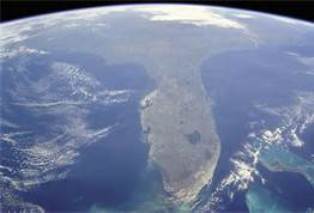|
After Shuttle Program, Space Coast Focuses on Abandoned Citrus Town  April 29, 2013 | WMFE - Twenty miles north of where the shuttle used to launch from Florida's Space Coast is an abandoned citrus community known as Shiloh. This 150 acres of scrub is at the center of the Space Coast's transition from the shuttle program to tomorrow's space flight. There's interest in turning Shiloh into the world's first commercial orbital launch site. Environmentalists are ambivalent. But space advocates say it would help revitalize the region, which has languished since the shuttle program ended. Shiloh is located within the Merritt Island National Wildlife Refuge, among the nation's most popular destinations for bird watching. The refuge is home to 300 species including the American Bald Eagle and the threatened Florida Scrub Jay. "It probably was just a typical small rural community that was primarily orange groves," says Layne Hamilton, the refuge's manager. "But if you look around you, you can see how resilient the habitat is. It's come back in so many different, you know, it's hard to find where the old orange groves were." NASA took possession of the land at the start of the space program more than 50 years ago. Now the private space company SpaceX has identified Shiloh as a possible place for a commercial orbital launch site. SpaceX also is considering sites in Texas, Georgia and Puerto Rico. The company declined to comment for this story, but founder Elon Musk told the Texas Legislature recently their state is the front-runner. "We're talking about something that's really the big leagues here," he said. "This would be a commercial version of Cape Canaveral. So it would be a historical first in the world." That's tantalizing on the Space Coast. The area has undergone an identity crisis since the shuttle program ended in 2011. Thousands have lost jobs, home values have plunged and the declining population has forced some schools to close. "I've been here my whole life," says Dale Ketcham, director of spaceport research and technology at the University of Central Florida. "I would be extremely disappointed to watch a new, commercial, exciting, innovative, clean, new way of launching develop in Texas." But NASA is reluctant to give up Shiloh. Any commercial company already has everything it needs on existing government sites, says Bob Cabana, director of the Kennedy Space Center. Putting those sites to use would be good for NASA and taxpayers. "We have a launch pad. We have infrastructure that is available," he says. "We want to make it available for commercial operations, and we want them to be as autonomous as they possibly can be." Already SpaceX launches commercial missions from government sites here. But Musk and other space entrepreneurs want their own site free of access, environmental and other government restrictions. Shiloh's ideal because it's on the Space Coast, says Frank Dibello, president and chief executive officer of Space Florida, the state's economic development agency for space. But it also is isolated enough that it won't interfere with neighboring government sites or residential communities. "The state needs to have a commercially operated space port that is separate from federal property," he says. At a recent luncheon of the National Space Club Florida Committee, DiBello said the launch site could create hundreds of jobs, and it could be ready in just a few years. He said commercial space flight always has been part of U.S. space policy. "As federal budgets become even tighter over the next decade both the Department of Defense as well as other civil agencies are going to depend more and more on commercial reliance and commercial activities," he said. Many environmentalists worry a launch site on land now managed by the Merritt Island National Wildlife Refuge would jeopardize birds, wetlands and historic, cultural treasures such as an 18th century sugar plantation. Hamilton shares these fears. But she believes the Space Coast can balance its ambitions for the future with the preservation of natural spaces like Shiloh. "It would be hard to accept, but you know I want to see, on the other hand, I do want to see space industry expand in this area," she says. Musk says he wants to decide where to put his commercial orbital launch site by the end of the year. |
|